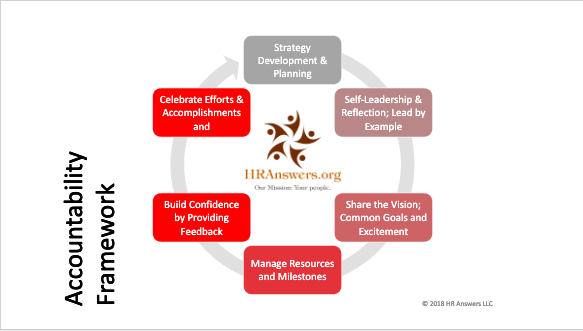If you’ve ever worked in an environment with low accountability, you know the impact it can have on the workplace culture. High performers feel like they have to pick up the slack for problem employees. Leaders are either micromanagers or they’re just watching the clock. And workers feel like they’re undervalued and under constant surveillance. Trust is low, tensions are high, and there’s more blame and finger-pointing going around than praise or constructive feedback. In short, it’s a place with low morale, poor performance, and high turnover.
A culture of accountability, on the other hand, is one in which leaders and employees at all levels of an organization demonstrate ownership of their work and operate in a way that prioritizes achieving company objectives with integrity. Workers hold themselves accountable, conduct themselves proactively, self-manage, and remain personally motivated and committed to achieving results.
But building a culture of accountability doesn’t always come easily. It takes a concerted effort, strong leadership, employee buy-in, and supportive systems and processes.
Here’s how you can begin building a culture of accountability in your organization:
Lead With Accountability
Accountability starts at the top. To cultivate a culture of accountability, employees first need to see that the leadership in the company operates with integrity and values accountability. As a leader, you have to start with leading by example and hold yourself to a high standard. If you fall into a pattern of broken promises, missed deadlines, or poor performance on your part, employees will see this as a pass to follow suit, causing ripple effects throughout the organization.
Not only is it important for you to do what you say you are going to do, but it is also important to communicate openly with your team about plans, actions, and results. The key is to demonstrate what it looks like to follow through and own up to whatever happens–sharing successes, challenges, and failures whenever possible, which often means being vulnerable.
As a leader, you might have to admit to mistakes, miscalculations, or shortcomings that impact the company. Sometimes you’ll shoulder the responsibility even when it feels like someone else dropped the ball. And while this isn’t as fun as sharing successes, it can go a long way toward building trust and respect within your team. It also gives you the opportunity to model resilience and grit as you course correct, overcome obstacles, and continue moving forward.
Increase Your Personal Accountability
No leader is perfect, but what matters is that you strive for continuous improvement. If you want to build a culture of accountability, you’ll have to take a hard look at where you could be doing a better job with your own accountability.
Look closely at your personal performance by gathering information from employees, clients, contractors, vendors, family members, and anyone else you interact with to get your job done. Think about your encounters with them, how you’ve communicated, and what you could’ve done better. Consider the times you’ve let someone down, what caused you to fall short, and what you learned from the experience.
Your personal competence, performance, and accountability depends on your self-awareness and self-management. So if you are going to expect the best out of the people who work for you, first you’ll need to take an honest look in the mirror and do the work necessary to improve. The same holds true for leaders at every level of your organization
Normalize and Prioritize Feedback
When you start by holding yourself accountable, many employees will follow your lead; however, you will still need to be explicit about your expectations and coach your employees along the way. In a workplace that values accountability, everyone on the team has to be willing to give and get input, provide and receive constructive criticism, and express and accept praise.
In a culture of accountability, regular feedback should be a normal and comfortable part of your working relationships. If your team hears from you often about their performance on a consistent basis, they’re far more likely to be receptive to feedback, even if it’s tough to hear. Nobody respects a boss who only shows up to criticize or discipline them if they’ve done something wrong.
So if you want your team to put forth their best effort, take responsibility, and truly own their job, you have to be willing to have difficult conversations and create a safe space to talk about almost anything. Otherwise, you can expect some employees to pass the buck, blame leadership, or even lie when things hit the fan. The goal is to open a productive dialogue that encourages accountability.
To promote accountability in the workplace, you’ll need to build self-confidence among your employees. If employees aren’t reaching milestones or meeting expectations related to stated goals and objectives, have a plan in place to address their performance issues. If something isn’t working for employees, be willing to hear and address their concerns. And always create opportunities to celebrate success.
Set Your Employees Up For Success
Promoting accountability doesn’t mean getting tougher on discipline and holding everyone’s feet to the fire. It means creating a work environment that sets your employees up to be able to meet and exceed expectations. And establishing an environment that promotes accountability isn’t a fluffy feel-good exercise, but rather a process that requires careful planning, systems, and ongoing evaluation.
After setting clear expectations with your vision, mission, values, job descriptions, and performance plans, the next step is to get more specific by communicating critical milestones, dates, and deadlines. Then, put systems in place to establish and monitor accountability.
While cultivating accountability is a process that’s based on self-awareness and human relationships, implementing a program of accountability requires structure, documentation, and processes that will enable consistency, objectivity, and fairness.
Work to get everyone on the same page and make it a team effort. If your employees know what the company is looking to accomplish by promoting accountability, you can celebrate efforts and progress together.
Improving accountability in the workplace will always be a work in progress, but it is an essential step to developing a high-performing team and creating a great place to work.
Are you looking to build a culture of accountability at your organization? At HRAnswers.org, we’ve developed a five-part accountability framework that serves as the basis of our consulting and custom training solutions. Schedule a free consultation today to discuss your needs.




